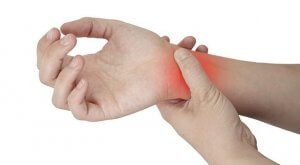How to treat tendinitis

When performing physical activity, we tend to focus on eating and exercising; however, the systems, organs, and tissues that make up our body are as important as eating and training. This is why it’s so important to know which mishaps may arise while training and how to treat them, as in the case of knowing how to treat tendinitis.
Muscles, ligaments, and tendons
Any movement that our body makes involves using muscles, ligaments, and tendons. With time, these grow stronger, allowing our bodies to perform more difficult exercises. At the same time, we expose our bodies to different risks that could affect their performance.
Besides the muscles and ligaments, the tendons are crucial for movement because they’re the tissues that join the muscles with the bones. In consequence, any damage that they may suffer will not only influence your performance but will also affect your movements, or even the way your muscles and joints rest.

In other words, tendinitis, also known as tendinosis, is a pathology that causes inflammation of the tendons due to injury or overexertion of the muscle. Understanding how to treat tendonitis is essential since it’s a common diagnosis for athletes. Keep reading if you want to know more!
Tendinitis
Tendonitis is common in sports where flexibility is needed, such as swimming or athletics. Because of this, we recommend that you take into account the following aspects to avoid suffering from tendinitis:
- Don’t exercise without warming-up first: this is detrimental to the tendons as they are not accustomed to performing demanding movements.
- Eat healthy food: stick to a diet that will give you all of the nutrients that you need to ensure that your tendons are in good condition, which will also prevent possible injuries or pathologies.
- Avoid bad posture and overexerting yourself unnecessarily: making a wrong movement or misusing your muscles can cause inflammation.
- Get plenty of rest: when you rest, your muscles, tendons, and ligaments recover from the microcracks generated during exercising. Therefore, getting plenty of rest is crucial for keeping the tendons in good condition.
How to treat tendinitis?
Now, we know that tendinitis is characterized by inflammation of the tendons, which in turn causes pain. In addition to having inflamed tendons, the skin around the affected area will usually turn red. Typically, the shoulders, heels, knees or elbows are the areas that are most prone to tendinitis.

Curing tendinitis
Treating tendinitis doesn’t require much effort; above all, it’s crucial to relieve the pain because it’s usually constant, making it annoying to move the joints or contract the muscles. Keeping this in mind, the options for dealing with and curing tendinitis are the following:
- Massage the damaged area: giving light massages with creams or oils helps to reduce the inflammation. Castor oil is ideal for reducing this type of pain, so you can apply it to the skin where the injury occurred.
- Apply cold or hot compresses: this will depend on the degree of inflammation and stiffness of the injured area. That is, if the pain is very mild it’s better to use a cold compress, but, on the other hand, if it is an intense pain it’s advisable to apply a warm compress to relax the inflamed tendons.
- Rest: depending on the severity of the tendinitis, you should allow yourself total or partial rest. So, if the inflammation and the pain are very severe, it’s essential you give yourself time to rest; if, on the other hand, the swelling and pain are mild, reducing the amount of effort and physical activity is enough to allow the tendon to heal little by little.
- Take anti-inflammatories: you can also take analgesics to speed up the recovery process, it’s important that be drugs are steroid-free, such as ibuprofen. Similarly, you can consume natural inflammatories such as pineapple or cucumber.
- See a physiotherapist: this is the most convenient option, especially for athletes. Sports injuries deserve special treatment. Going to a sports physiotherapist and following their instructions is the best way to help your tendons to recover.
Although tendinitis isn’t a severe pathology, it needs to be treated like any other injury. Don’t belittle any sign of injury and follow our recommendations to eliminate the tendinitis. But most importantly, take care of your body, and remember that it’s your most precious asset!
When performing physical activity, we tend to focus on eating and exercising; however, the systems, organs, and tissues that make up our body are as important as eating and training. This is why it’s so important to know which mishaps may arise while training and how to treat them, as in the case of knowing how to treat tendinitis.
Muscles, ligaments, and tendons
Any movement that our body makes involves using muscles, ligaments, and tendons. With time, these grow stronger, allowing our bodies to perform more difficult exercises. At the same time, we expose our bodies to different risks that could affect their performance.
Besides the muscles and ligaments, the tendons are crucial for movement because they’re the tissues that join the muscles with the bones. In consequence, any damage that they may suffer will not only influence your performance but will also affect your movements, or even the way your muscles and joints rest.

In other words, tendinitis, also known as tendinosis, is a pathology that causes inflammation of the tendons due to injury or overexertion of the muscle. Understanding how to treat tendonitis is essential since it’s a common diagnosis for athletes. Keep reading if you want to know more!
Tendinitis
Tendonitis is common in sports where flexibility is needed, such as swimming or athletics. Because of this, we recommend that you take into account the following aspects to avoid suffering from tendinitis:
- Don’t exercise without warming-up first: this is detrimental to the tendons as they are not accustomed to performing demanding movements.
- Eat healthy food: stick to a diet that will give you all of the nutrients that you need to ensure that your tendons are in good condition, which will also prevent possible injuries or pathologies.
- Avoid bad posture and overexerting yourself unnecessarily: making a wrong movement or misusing your muscles can cause inflammation.
- Get plenty of rest: when you rest, your muscles, tendons, and ligaments recover from the microcracks generated during exercising. Therefore, getting plenty of rest is crucial for keeping the tendons in good condition.
How to treat tendinitis?
Now, we know that tendinitis is characterized by inflammation of the tendons, which in turn causes pain. In addition to having inflamed tendons, the skin around the affected area will usually turn red. Typically, the shoulders, heels, knees or elbows are the areas that are most prone to tendinitis.

Curing tendinitis
Treating tendinitis doesn’t require much effort; above all, it’s crucial to relieve the pain because it’s usually constant, making it annoying to move the joints or contract the muscles. Keeping this in mind, the options for dealing with and curing tendinitis are the following:
- Massage the damaged area: giving light massages with creams or oils helps to reduce the inflammation. Castor oil is ideal for reducing this type of pain, so you can apply it to the skin where the injury occurred.
- Apply cold or hot compresses: this will depend on the degree of inflammation and stiffness of the injured area. That is, if the pain is very mild it’s better to use a cold compress, but, on the other hand, if it is an intense pain it’s advisable to apply a warm compress to relax the inflamed tendons.
- Rest: depending on the severity of the tendinitis, you should allow yourself total or partial rest. So, if the inflammation and the pain are very severe, it’s essential you give yourself time to rest; if, on the other hand, the swelling and pain are mild, reducing the amount of effort and physical activity is enough to allow the tendon to heal little by little.
- Take anti-inflammatories: you can also take analgesics to speed up the recovery process, it’s important that be drugs are steroid-free, such as ibuprofen. Similarly, you can consume natural inflammatories such as pineapple or cucumber.
- See a physiotherapist: this is the most convenient option, especially for athletes. Sports injuries deserve special treatment. Going to a sports physiotherapist and following their instructions is the best way to help your tendons to recover.
Although tendinitis isn’t a severe pathology, it needs to be treated like any other injury. Don’t belittle any sign of injury and follow our recommendations to eliminate the tendinitis. But most importantly, take care of your body, and remember that it’s your most precious asset!
This text is provided for informational purposes only and does not replace consultation with a professional. If in doubt, consult your specialist.








